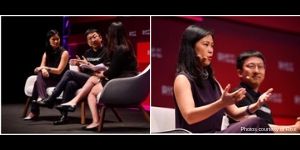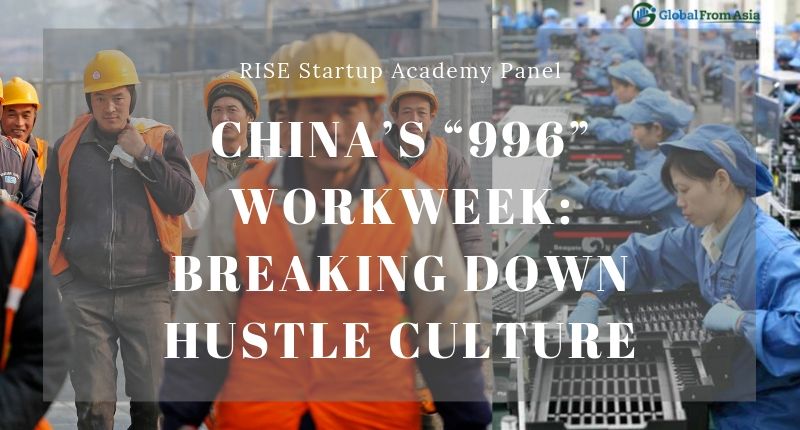
Panel: Joshua Zhang, Ucommune (China)
Cynthia Salim, Citizen’s Mark (Singapore)
For years, bosses in China’s tech sector have not just demanded their employees keep punishing working hours, they have evangelized it: Jack Ma once called the 72-hour work week “a blessing.”
Whether or not Alibaba’s engineers actually appreciate that blessing, the fact remains that most internet companies in China still push the “996” workweek on their employees—working 9am to 9pm, six days a week. At minimum.
Many rank-and-file employees and Chinese labor activists decry 996 as not just exploitative but actually a violation of national labor laws. In March, a group of software engineers in China launched the “996.ICU” repository on Github as a place to share their experiences and name unscrupulous employers. The “.ICU” suffix refers to an adage among Chinese tech workers that working 996 can put you in the Intensive Care Unit.
For hungry entrepreneurs, however, 996 has represented the secret ingredient of success for China’s tech sector: The People’s Republic has a growing pool of engineering talent from top universities and a vast market to serve. All that’s needed to edge out Silicon Valley, so the theory goes, is the grit of Chinese workers.
But could 996 be hurting China’s tech sector and, more importantly, its people? According to the South China Morning Post, the average tech worker in Silicon Valley stays at a given job for 3.7 years, whereas in China that time is just under 2.6 years. Could worker burnout be the cause?
So, is 996 essential for a startup’s success, or just a toxic lifestyle? At this year’s RISE conference, two highliners from Asia’s startup scene spoke from opposite sides of this issue: Joshua Zhang, founder of the Ucommune, a Beijing-based coworking provider and Cynthia Salim, founder of Citizen’s Mark, an ethical fashion label from Singapore.
Here are some key takeaways from their spirited discussion at this year’s Startup Academy:
For startups in China, 996 isn’t about success—it’s about survival
Joshua is an ardent practitioner of 996 in his own startup, and he credits Ucommune’s meteoric rise—in just four years they have opened over 300 locations in 40 countries—to the breathtaking work ethic of his team. Moreover, he maintains, for a startup in China the fierce competition of a global marketplace means that survival itself demands relentless working hours. If they aren’t ready to work 996, he said, “most startups are dead.”
Joshua Zhang (JZ): “Most startups have to work very, extremely hard, 24 [hours] by 7 [days a week], at least in mainland China…. I think no one can deny that [global] information flow nowadays is quite effective. So, I believe no one can have a unique idea. As long as you have this idea and prototype and start promotion, [then] everyone knows [about it]. So if you don’t work very fast with full energy, people will copy [you] and occupy the market.”
996 is a lifestyle where work is its own reward.
Joshua views 996 not as something a company should demand of its employees (although many firms in China do), but rather something its employees should demand of themselves.
JZ: “Personally, I see it as a lifestyle. It is something that you follow in your heart. We don’t have regulations that require people to work 996, but for most of our staff I see that they want to do it automatically. Because in a startup, if you want to work, there is plenty of work to do.”
As an example, he described his team at Ucommune as a self-selecting group of workaholics who put in Promethean workweeks out of sheer passion for his company’s vision. They don’t do it for the check, or stock options, or because of “some paper from HR.”
Your startup’s work culture reflects how you value them as individuals.
Following Joshua’s passionate defense of overwork, Cynthia countered that her own success was achieved through “tremendous work-life balance.” And she should know something about success: Following her time at the United Nations and McKinsey, she made it onto the Forbes ‘30 under 30’ list for her Manhattan startup.
Cyntha Salim (CS): “Did we work hard? Did we work on the weekends? Yeah, all the time…. But I certainly never had the kind of culture where we would work people to the bone and work them to death. My perspective, and this is arguable, is that we borrow our employees from their families.”
Although she was not speaking from the perspective of the China market, Cynthia’s message resonated with this panel’s audience. When RISE polled those attending this talk, only 18% agreed that startups (irrespective of locality) should be embracing the 996 workweek.
In a bear market, 996 won’t be going away anytime soon.
Speaking of stock options, Joshua added that, for employers hamstrung to offer financial rewards to employees due to the recent slump in China’s tech market, finding people passionate about working long hours is more vital to business than ever.
JZ: “I think during the economic downturn, what is most important is we have to look inside. To find the fundamental value of the company and find people that really agree with the value, really agree with the target value mission, vision and strategy etc. If you find the people that really agree with this, and you can fight together, rather than people who come [just] for promotion, for bonus, for rewards, [then] I think that’s the right way to go.”
If you’re a founder, be prepared to work harder than your employees.
Cynthia didn’t agree that it’s fair to hold fully vested startup founders to the same standards of personal commitment as their employees.
CS: “When I started my company I had to really sit with this uncomfortable realization that, even though the people that work for me were very mission-oriented… your workers are never going to love it as much as you do. So, can you expect the same kind of commitment from your employees as you, as a founder? Absolutely not.”
996 might unlock success—but remember, not all startups are the same.
Cynthia suggested that 996 may better suit startups with a “winner-take-all” mission statement and the goal of a billion-dollar valuation.
CS: “It also depends on what kind of startup you’re running. I always believed in being a culture where you [the startup] can win, and you can be great, without being ‘the biggest’ or ‘number-one….’ There are many paradigms between never starting a company and launching a billion-dollar, winner-take-all company.”
In the end, it’s about what you want out of your life.
Both panelists agreed that what you put into your startup should reflect your personal values and goals. Joshua echoed his warning that, if you do choose to adopt 996 yourself, make sure you’re doing it to follow your passions, not at the direction of your boss. Cynthia maintained that a startup can still be successful while preserving a culture that prizes work-life balance.
CS: “As an entrepreneur, you could work 24 hours if you really wanted to. You can always put in more and get more back, but at the end of the day, why do we exist? What are your obligations to the people around you? Your family? Your community?”
“[Work-life balance is] about defining who you are, what your values are…. There were times where I burned the midnight oil, when I hit it hard at my consulting jobs or in building my startups. I looked at that as a holistic life plan for what I wanted my entire life to look like.”
What do you think of the 996 lifestyle, and have you adopted as part of your own personal growth strategy? Let us know in the comments! And remember, all work and no play makes Jack a dull boy (unless you’re Jack Ma.)

